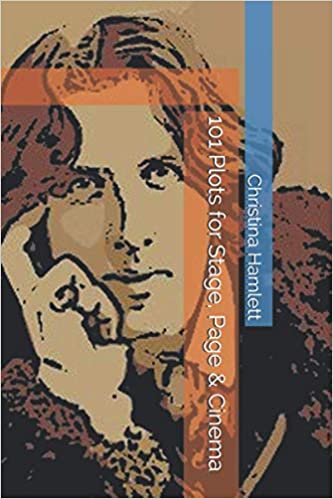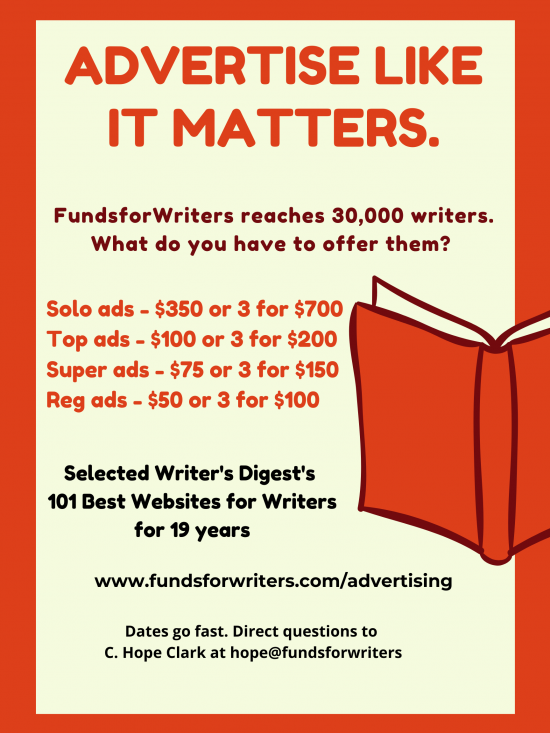|
|
TOP SPONSOR

EDITOR’S THOUGHTS
HOW DID YOU DO IT?
In the writing world, writers hang on understanding how another writer found success. They want to know the secret, the magic, or the inherent talent required to duplicate that success. We want to know the right path out of the woods.
No two writers find success the same. That is the wonder and the bane of this profession. A writer's career is as unique as writing itself, and what works for one person is not going to work for many others.

Yet there are so many how-to-become-successful classes out there, and they do quite well. The eager and the excited, the desperate and the seeking-short-cut folks, sign up these classes thinking this is how to keep from having to do the research themselves.
The best way to become successful is to get down in the mud and figure it out on your own.
Why not capitalize on someone else's experience? Because you cannot duplicate it. Writing success depends on:
-the ability to write
-the ability to write a specific genre
-family composition
-other income
-health
-place of residence
-mobility
-technological savvy
-connections
-introvert vs. extrovert
-age
-education
-experience
-upbringing
-simple luck
-the discipline to sit in the chair
I am finding success with my Edisto Island Mysteries. That path was as crooked as a dog's hind leg. Some of the journey was purposeful, but a lot of it was crossroad after crossroad, and then selecting one road or another. My journey cannot be duplicated. Yet people still want to know how I did it and what I suggest for them.
So, the question is not how I did it. The question is how to see success on the horizon and choose the right path to it. My suggestions are these.
1) Quit looking for why something will not work. Look for why it will. Thinking negatively silently infects everything you are trying to do and sabotages potential.
2) Commit to the journey. It may not happen this year just because that was your New Year's resolution. You may have to think long distance, as in numbers of years.
3) Accept all sorts of detours. Take the speaking engagement. Take the feature article for the local mag. Create a banner and show some self-appreciation. Write somebody's website copy. The key is to become known as a writer.

4) Respect people. You never know who is going to open a door . . . or shut it on you.
5) Love every single reader. Respond to them.
6) Do not brag. Nobody likes it. There's an art to self-promotion.
7) Do not criticize others in the profession. Keep quiet about what you disagree with unless what you stand up for is in your platform. Be careful being opinionated. The world is sick of negativity.
8) Be flexible when opportunity strikes. Sometimes it doesn't announce itself as opportunity.
9) Be forward thinking and positive.
You want to be depicted as positive and someone who sees only potential. Why? Because everyone wants a piece of that. Not everyone thinks that way, and if you do, no matter what you do, sell, or promote will be more open-armed accepted.

SUPER SPONSOR

You’re working hard for success.
We’ll help you be ready for when you find it.
Most people learn the business side of their passion by failing—a lot. It can cost you time, money, stress, and lead to total burnout. Learning how to run your business isn't complicated. You just need to know where to start.
Our team of professional freelancers created a guide to teach you the ins and outs of managing your freelance business. Our free mini course on Freelance Management will help you analyze your finances, reach new clients, plan for growth, and more.
Running your business doesn’t have to mean running yourself ragged. Try our free course today, and start running your business like a pro.
Click Here
HOPE'S APPEARANCES
|
Email: hope@chopeclark.com to schedule events, online or otherwise. There's starting to be life out there!

|
- March 22, 2021 - Guest Presenter - St. Andrews Women's Club, St. Andrews Presby Church, Irmo, SC - 7 PM Eastern
- April 5, 2021 - Presenting Salkehatchie Secret, Night Harbor Book Club, Chapin, SC 7-8 PM
- April 10, 2021 - Zoom presentation, Piedmont Authors Network, 1-2:30 PM
- April 17, 2021 - Signing - The Coffee Shelf, Chapin, SC Noon-2 PM
- April 24, 2021 - Signing - Edisto Bookstore, Edisto Island, SC 3-5 PM
- May 1, 2021 - Signing - Main Street Reads Bookstore, Summerville, SC - 11 AM
|
SUCCESS QUOTE
“Smart people learn from everything and everyone, average people from their experiences, stupid people already have all the answers.”
– Socrates
SUccess Story
Dear Hope,
Last fall I had been thinking about joining a writer's critique group for feedback and encouragement on my writing. I read your announcement about FanStory
, checked it out, and subsequently joined. I have met many excellent writers, some of whom have become
friends and followers. The helpful feedback I receive has been an encouragement to submit more writing. Two of my poems reached "Recognized" status, and another poem took second place in a contest.
I would not have discovered this writers' group without your promotion. Thanks, Hope, for your announcement and support of this writers' group.
Sincerely,
Carol Clark
- - -
If you have a success story you believe was prompted by FundsforWriters, please share with us! Send to hope@chopeclark.com
Featured article
13 Tips Your Editor Wants You to Know (But Is Too Busy to Tell You)
By Sharon Holbrook
As a writer, I know that hitting “send” can feel like throwing your work into a frightening void. Now, as a magazine editor, I’ve collected scraps of insider info that I wished I’d known before I became an editor. So — I give them to you.
1. I want you to succeed.
Every time I open a new piece or pitch, I’m rooting for it to be great. It’s not just that it makes my job easier. (Though it does, immensely.) It’s just a delight to read good work — and that’s what our readers want, too. I’m on your side.
2. When pitching, express enthusiasm.
Pretend you work for the publication and want to see it succeed and do great work. (You’re on our side, too, right?) Say, “I’m fascinated by this question, and I haven’t seen it covered. It might be a fit for your readers because of x.”

3. Sometimes I don’t know exactly what I’m looking for.
That is, until I see it. If you can anticipate what our readers will respond to, or what our coverage is missing, you’re golden.
4. Add voice and life to essays and articles.
This is the number one thing I cannot edit for. If you make a typo, I can fix that. If you are clumsy in using quotes, I can fix that. If you have a tangential sentence or paragraph, I can fix that. If you are boring, I cannot fix that.
5. Find the through-line.
Your piece should have a point. You don’t need to hit the reader over the head with it — please don’t — but your essay or article should have a unifying thread. After reading the piece, the reader should feel that they gained something — and as the writer, you should know what that something is when you’re writing.
6. Sometimes what I really want to say is, “Your writing needs work.”
But I don’t, because between strangers over email, it sounds unnecessarily cruel. If you’re not getting traction with editors, it might be useful to find a writing class or a writing group to provide instruction and feedback.
7. Don’t take edits personally.
Everyone needs to be edited, even editors. After I edit, at least three more people edit, and they always identify additional edits needed. And they’re usually good suggestions, things that I missed or that make the piece better. It’s just part of the process.
8. Editors make mistakes.
Don’t argue or assume the worst if you don’t hear back as promised or don’t get paid on a given date. Just ask politely. Mistakes happen. We’re human.
9. Be enthusiastic and pleasant.
You’ll get more work. Because we are human, editors like nice people.
10. Don’t be sloppy.
We’ve all forgotten to attach the document to the email, and we all make typos. No worries. But if you’re sending a piece that is in two very obviously different fonts or that just dumps block quotes into a document – don’t.

11. I don’t want to micromanage you.
If you’re not sure what angle I want, ask “Would you like approach A or B? I prefer A b/c XYZ.” Not “Here are the quotes from my experts; which ones do you like?” I want to see initiative.
12. Don’t use my personal email or social media to reach me.
I’m overwhelmed already with messages. (Aren’t we all?) Exception: It’s fine to ask on Twitter if you can email me at work, and I’m happy to give you my email address.
13. Be curious.
Ask good questions. Dig a little deeper. Take a genuine interest in the subject matter. Find the surprises. Share them with us. It’s hard for an editor (or a reader) to resist a curious writer.
BIO: Sharon Holbrook is a freelance writer and the managing editor at Your Teen Media. Find her at sharonholbrook.com.
COmpetitions
Fix, Grist’s solutions lab, is launching a new climate-fiction contest, Imagine 2200: Climate Fiction for Future Ancestors

The contest will award $8,700 in prizes and publication
Deadline: April 12, 2021 | No entry fee
Imagine calls for short stories (3,000–5,000 words) that envision the next 180 years of climate progress. Judges include renowned authors Adrienne Maree Brown, Kiese Laymon, and Morgan Jerkins.
The top three contest winners will be awarded $3000, $2000, and $1000 respectively, and nine finalists will receive a $300 honorarium. Winners and finalists will be published in an immersive digital collection.
Imagine draws inspiration from Afrofuturism, as well as Indigenous, Latinx, Asian, disabled, feminist, and queer futures, and the genres of hopepunk and solarpunk. We want to see — and share — stories that center climate solutions from the most impacted communities, and bring into focus what a truly regenerative future could look like.
More information . . .
GRINDSTONE INTERNATIONAL NOVEL PRIZE
https://www.grindstoneliterary.com/novel-prize
£16 ENTRY FEE. Early bird deadline April 1, 2021. Open to entrants from all over the world, our previous winners and shortlists have hailed from the UK, Australia, New Zealand, the United States, Canada, to name a few. The 2021 Novel Prize is open to unpublished or self-published, un-represented authors working on a novel aimed at Young Adult or Adult audiences. To be eligible, the finished (or projected finished) length must exceed 70,000 words. Works in progress are accepted in
this competition, and entries may be of any genre. Entrants are asked to submit the opening 3,000 words, accompanied by a short synopsis in the same file. Grand Prize - £1,000 and full manuscript request. Runner Up - £500. Four shortlisters - £100. The top 20 entries from the initial judging phases will also be curated into a chapbook and sent directly to a list of literary agencies.
GRINDSTONE SHORT STORY PRIZE
https://www.grindstoneliterary.com/short-story-prize
£8 ENTRY FEE. Early bird deadline May 1, 2021. Final deadline August 1, 2021. The Grindstone Short Story Prize returns this year, seeking out the best short fiction writers from around the world. Writers are asked to submit a piece of short fiction between 1000 and 3000 words, of any genre, aimed at adult readers. Grand Prize - £500. Runner Up - £200. Four shortlisters - £50. The top 20 entries will be curated into our yearly anthology and published in print.
EASTOVER PRIZE FOR ESSAYS
https://eastoverpresscutleafjournal.submittable.com/submit
$20 ENTRY FEE. Deadline May 1, 2021. The EastOver Prize for Essays (and other nonfiction) is open to a wide variety of book length non-fiction manuscripts by established and emerging writers. We are especially interested in collections of literary essays, but will consider memoirs, mixed genre works, works combining essays and original visual art, speculative nonfiction, and other hybrid works. The winner(s) of this contest will be offered publication with EastOver Press. Publication will
include $2,500 at the time of contract signing as well as other customary arrangements regarding book copies, royalties and so forth to be agreed at the time of contract signing. Finalists may also be considered for publication by the Press. All fees collected for submissions go towards payments for writers. The competition is open to manuscripts written in the English language from writers 18 and older who live in the United States or one of its territories.
EASTOVER PRIZE FOR FICTION
https://eastoverpresscutleafjournal.submittable.com/submit
$20 ENTRY FEE. Deadline May 1, 2021. One winner and multiple finalists may be declared at the conclusion of the contest. The winner of this contest will be awarded $2,500 and be published by EastOver Press. All prizes will be awarded upon successful completion of a contract for publication. Finalists in the contest may also be considered for publication by the Press. The competition is open to manuscripts written in the English language from writers 18 and older who live in the United
States or one of its territories.
ERNEST HEMINGWAY SHORT FICTION PRIZE
https://fictionsoutheast.com/ernest-hemingway-flash-fiction-award/
$10 ENTRY FEE. Deadline March 31, 2021. Entries for the Ernest Hemingway Flash Fiction Prize should be approximately 1,500 words or less. Winner receives $200 and publication in the journal Fiction Southeast. Finalists also published in the journal.
GEMINGA PRIZE FOR TINY FICTION, NONFICTION, POETRY, OR ART
https://sunspotlit.submittable.com/submit/183587/geminga-500-for-tiny-fiction-nonfiction-poetry-or-art
$6 ENTRY FEE. Deadline March 31, 2021. Contests honor the power of the small. No restrictions on theme or category. Word limit is 100 for fiction and nonfiction. Micropoetry is limited to 140 characters. Prize $500 and publication. Works should be unpublished except on a personal blog or website.
-1000 BELOW: FLASH PROSE AND POETRY CONTEST
http://midwayjournal.com/contest/
$10 ENTRY FEE. Deadline June 1, 2021. First Prize: $500 and publication in Midway Journal. Second Prize: $250 and publication in Midway Journal. Third Prize: $50 and publication in Midway Journal. Poetry: up to two poems per entry, up to 40 words per poem. No more than one poem per page. Prose (Fiction and Nonfiction): one piece per entry, up to 1,000 words per piece.
FORCE MAJEURE FLASH CONTEST
https://stormcellar.org/submit/contest/
$5 ENTRY FEE. Deadline April 30, 2021. Top prize for a single flash $300; two runners-up $100 each. Limit 1,000 words. May contain fiction, nonfiction, hybrids, marks, or images, in any combination. May bend genre.
PRIME NUMBER MAGAZINE AWARDS FOR POETRY AND SHORT FICTION
https://www.press53.com/prime-number-magazine-awards
Deadline March 31, 2021. Winning poem and short story will appear in Issue 199 of Prime Number Magazine on October 1, 2021. First Prize is $1,000 in each category plus Pushcart Prize nomination. Submit one (and only one) unpublished poem of no more than three pages. Submit one (and only one) unpublished short story of up to 5,300 words. Contest is open to writers anywhere in the world who write in English.
GRANTS / FELLOWSHIPS / CROWDFUNDING

AMERICAN LIBRARY IN PARIS VISITING FELLOWSHIP
https://americanlibraryinparis.org/visiting-fellowship/
Deadline April 1, 2021. The fellowship offers writers and researchers an opportunity to pursue a creative project in Paris for a month or longer while participating actively in the life of the American Library. Applicants should be working on a book project, fiction or nonfiction, or a feature-length documentary film, which contributes to cross-cultural discourse. We are not accepting poetry projects at this time. Fellowship award: a $5,000 stipend paid before start of fellowship period.
The award, to be spent at the discretion of the Fellow, is designed to cover travel to Paris, accommodation, and expenses associated with the month in Paris.
MARYLAND EMERGENCY GRANTS
https://www.msac.org/programs/special-requests/emergency-grant-independent-artists
Emergency Grants for Independent Artists provide funding to Maryland artists for losses sustained because of programming, operations, and events that have been modified or canceled due to the COVID-19.
MOONDANCER FELLOWSHIP - THE WRITERS' COLONY
https://www.writerscolony.org/fellowships
Deadline May 31, 2021. The Moondancer fellowship is awarded to an author who expresses their love of nature and concern for the environment through their writing. This fellowship is open to poets, fiction writers, playwrights, essayists, columnists, memoirists, and screenwriters. Prior publication is not a requirement. The submitted work sample should demonstrate literary merit and the promise of publication, or in the case of theater and film, production. The fellowship winner will
receive a two-week residency to allow the recipient to focus completely on their work. The submission period opens on Tuesday, March 8. The deadline is midnight on Monday, May 31, 2021. The winner will be announced no later than June 18, 2021. Residency must be completed by July 31, 2022. Exceptions will be made for COVID-19 concerns. Location Eureka Springs, AR.
HUGO HOUSE WRITER-IN-RESIDENCE
https://hugohouse.submittable.com/submit/28902/hugo-house-writer-in-residence-application
Deadline March 31, 2021. Applicants for the position should be practicing, published writers of poetry as well as accomplished and dedicated writing teachers who are experienced working with writers of all levels in a traditional workshop setting, as well as on a one-on-one basis as a mentor offering criticism and professional-development advice. Applicants should have a specific artistic project they are working on during their residency (e.g., developing a manuscript for publication) and
should have a special interest in helping writers become better writers and fostering an appreciation of the craft. Pays $500 per month stipend for nine months, plus additional compensation for Hugo Classes; access to a vibrant and growing community of, by, and for writers; an opportunity to work with a committed staff in a creative work environment; and support and encouragement for artistic projects. Each writer-in-residence has access to a shared writing office at Hugo House to work on their
writing project, or hold meetings.
MILKWEED FELLOWSHIP
https://milkweed.org/milkweed-fellowship
Deadline March 22, 2021. This paid, one- to two-year immersion program is designed to offer the tools, experience, and exposure necessary to pursue a career in book publishing or nonprofit fundraising. Intended to provide an alternative route to success in industries where the prerequisite to an entry-level position is typically an unpaid internship, this learning-oriented position seeks to provide entry to those historically underrepresented among workers in book publishing and
advancement—Indigenous, people of color, LGBTQIA+, and those with disabilities—so they may advance, discover, and champion transformative literature for years to come. This position is based on-site in our Minneapolis offices and is full time (non-exempt, 40 hours per week, for 12 to 24 months). Compensation includes a salary of $35,000 per year, generous paid time off, and health and dental benefits.
FREELANCE MARKETS / JOBS
CUTLEAF
https://cutleafjournal.com/submission-guidelines/
Cutleaf is interested in fiction of all shapes and sizes, although we are generally interested in work shorter than 6,000 words. We are also interested in flash fiction with a limit of 1,000 words. Cutleaf is also interested in essays in both standard and hybrid forms. We welcome new approaches such as speculative nonfiction, essays based in metaphor, essays in verse, and other re-imaginings of the format. We welcome work about literature, travel, music, visual art, and film in multiple
formats. We are less interested in journalistic approaches than in work that shows the larger and smaller truths about being human. Cutleaf will pay for published fiction and nonfiction on a sliding scale from $100 to $750. Cutleaf will pay for published poetry on a sliding scale from $50 to $200.
GUIDE
https://www.guidemagazine.org/writers-guidelines
Guide is a Christian story magazine primarily for readers ages 10-14. The 32-page, four-color publication is published weekly by the Pacific Press Publishing Association. Our mission is to show readers, through stories that illustrate Bible truth, how to walk with God now and forever. Each issue includes three to four true stories. Guide does not publish fiction, poetry, or articles (devotionals, how-to, profiles, etc.). However, we sometimes accept quizzes and other unique nonstory
formats. Each piece should include a clear spiritual element. Standard feature-length stories are 1,000-1,200 words, but we also accept shorter pieces of 450 words and up. Payment is 7-10 cents/word upon acceptance for first serial rights.
THE WRITER
https://www.writermag.com/the-magazine/submission-guidelines/
Our editors are interested in query letters on concrete topics written by emerging and experienced writers in all genres. We are looking for clear takeaway for our readers: What can they learn to improve their writing or advance their careers? What specific how-to tips and strategies will accomplish this? Article lengths vary widely from 300 to 3,000 words. On occasion, longer articles and excerpts also appear in the magazine. We also have special issues throughout the year that focus on a
particular theme.
MESSAGE MAGAZINE
https://www.messagemagazine.com/submit-story/
Our target reader is an 18- to 35-year-old urbanite who may not be religious but is seeking spiritual fulfillment and answers to life’s dilemmas. We love compelling comeback stories, inspirational and captivating profiles, well-crafted, timely features, and insightful Biblical analysis. Health, financial, professional, and relationship stories with a strong Biblical foundation will always be considered. Various features and columns available. Pays around 25 cents per word.
VFW
https://vfworg-cdn.azureedge.net/-/media/VFWSite/Files/Media-and-Events/Magazine/Writers-Guidelines.pdf
VFW magazine is published by the Veterans of Foreign Wars. Subscription is largely through VFW membership, which is restricted to honorably discharged veterans who received an officially recognized campaign medal. Recognition of veterans and military service is paramount at the VFW. Articles related to current foreign policy and defense, along with all veterans' issues, are of prime interest. Topics pertaining to American armed forces abroad and international events affecting US
national security are particularly in demand.
GRIT
https://www.grit.com/guidelines
DO NOT try to write for GRIT if you know nothing about rural life, gardening, or urban farming. We intend to be an authoritative and sometimes playful voice for rural lifestyle farmers and country or small-town dwellers, and we require our writers to be informed about that way of life. GRIT publishes feature-length articles on topics of interest to those living in rural areas, on farms or ranches, or those interested in the rural lifestyle. Features generally range from 1,000 to 2,000
words. Departments and columns are usually 500 to 1,500 words. Good quality photos accompanying manuscripts are welcomed.
BLOOM MAGAZINE
https://www.magbloom.com/submissions.html
Bloom Magazine is a culture and lifestyle magazine based in Bloomington, Indiana. Every issue includes articles on home & family, arts & entertainment, food & wine, health & fitness, fashion & shopping, and personal finance—plus all the interesting people, places, and events that make life in this part of south-central Indiana so worth celebrating. Our readers are both visitors to Bloomington and its adult, professional, working population. We are looking
especially for good ideas for stories in Fashion/Shopping, Business/Finance (including personal finance), Health/Fitness, and Home/Family. Usually, the articles in these departments are service pieces (350-400 words) that inform or help our readers in some practical way.
INSIDE FITNESS
https://insidefitnessmag.com/contact-us/
Inside Fitness accepts outside contributions from qualified industry professionals. Please familiarize yourself with our content and style before contacting the Inside Fitness editors with a submission. Inside Fitness magazine is Canada’s number one fitness magazine and is published by IFM Media Inc. With a distinct Canadian flair, the magazine caters to readers all over the world, covering the latest trends in health, sports, strength and conditioning, fitness, nutrition, and
more.
IMMERSE
https://immerse.news/call-for-proposals-mayjune2021-4fc481b7184
Deadline April 2, 2021. Playing With Reality, Immerse’s May/June 2021 issue, will be themed around games and nonfiction media. We are interested in probing the influence of game engines, tools, infrastructure, and logic on immersive nonfiction storytelling projects. We are also interested in how immersive and emerging forms of nonfiction interact with and in turn affect gaming platforms, spaces, narratives, and notions of audiences. We are seeking proposals for pieces of
1,200–1,500 words that critically and imaginatively reflect on these approaches. Proposals should be 200 words or less in length and submitted by Friday, April 2, 2021 to editor@immerse.news. Accepted proposals will be notified by mid-April. Our standard fee is $250.
Publishers/agents
FAIRLIGHT BOOKS
https://www.fairlightbooks.co.uk/about-us/
Fairlight Books has one aim – to celebrate quality writing and promote the best of new and contemporary literary fiction. With a specific focus on quality rather than quantity, we intend to publish contemporary adult literary fiction and well-written genre fiction. As part of our mission to make quality writing more discoverable, we’ve set up Fairlight Shorts. This online short story portal showcases some fantastic, but previously unpublished, short story writing. Fairlight
Books is open to literary submissions of short stories, novellas (between 25,000 and 50,000 words) and novels.
SPONSORS

www.fundsforwriters.com/advertising
FINE PRINT
Please forward the newsletter in its entirety. To reprint any editorials, contact hope@fundsforwriters.com for permission. Please do not assume that acknowledgements listed in your publication is considered a valid right to publish.
C. Hope Clark
E-mail: hope@fundsforwriters.com
140-A Amicks Ferry Road #4
Chapin, SC 29036
http://www.fundsforwriters.com
Copyright 2000-2020, C. Hope Clark
ISSN: 1533-1326
**Note that FundsforWriters.com places paid advertising in this newsletter, ALL ads being related to writers and the business of writing, screened by FundsforWriters to make sure the information is suitable for writers and their endeavors to improve their careers. But the mailing list is not sold to third parties. You will not receive this newsletter without your
permission. It's physically impossible since recipients must opt-in, giving us permission to send the newsletter. If at any time you no longer with to receive the newsletter, click the UNSUBSCRIBE link at the bottom of each newsletter. We want you to enjoy this newsletter at your pleasure, not be forced to read anything you do not wish to receive. The website is not advertised using unsolicited messages by Aweber, affiliates or other third parties. Direct any complaints, suggestions, and
accolades to Hope Clark at hope@fundsforwriters.com. We are an anti-spam site.
|
|

